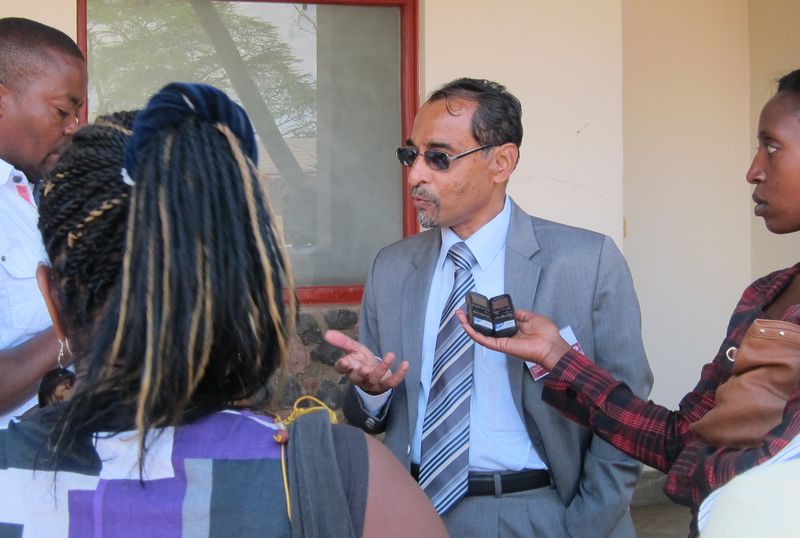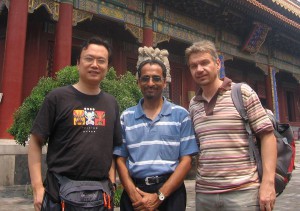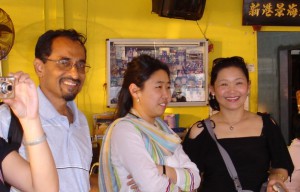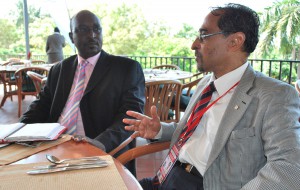“WE IN THE ICRC CAN CONTRIBUTE TO RELIEVING SUFFERING…,” says Umesh Kadam, who joined the ICRC in New Delhi in 1998 and is currently the Regional Legal Adviser at the Nairobi Regional Delegation of the organization. Umesh taught law for 18 years before he decided to join the ICRC and has since worked with various delegations in South, East Asia as well as Africa. The ICRC New Delhi blog interviewed Umesh about his life and work, and how the organization and its people have evolved over the years.
In which year did you start working with the ICRC and in what capacity? Did you know anything about the organisation before you were hired?
From 1994, I was invited as a speaker to New Delhi and other places when the delegation started a dissemination programme for academic circles. When the customary law study was launched in 1995 by the ICRC, I came in contact with Denise Plattner who was the legal adviser in Delhi. I was associated with that study. It was in 1997 when I was in Delhi for a national seminar on International Criminal Court, organized by the ICRC, that the Head of Delegation asked me if I would like to join the ICRC. I thought it was a good opportunity because I had already taught for about 18 years and I wanted to add some practical dimension in the area of humanitarian law. I was deeply interested in laws of armed conflict. So I joined the delegation as a legal officer in February 1998. Within one year the regional legal advisor’s position was vacant and nobody was appointed. This was an expatriate position. The head of delegation wrote to the Headquarters in Geneva saying we have someone very competent for the position and I was promoted. I covered South Asia but continued to be based in New Delhi.
So when did you move to other delegations away from India?
In 2004, I was offered a new position that was created in the Kuala Lumpur delegation for promotion of IHL in academic circles in 15 countries of South East and East Asia. So I took it up and worked in Malaysia for 5 years. As my mission was coming to an end in 2008, I informed the headquarters that I was interested in working as a communications delegate and also that I was keen to work in Africa. I was always fascinated by this continent because of its history, the wars and so on. So I was offered to go to Ethiopia as a communications delegate and was there for two-and-a-half- years.
Later, when this position for regional legal advisor was created I decided to go back to core legal work and came to Nairobi in June, 2011. Now it has been 17 years since I have been with ICRC. I very much like working for the ICRC and I am convinced that the decision that I took in 1997 to join the ICRC was very good. I have received excellent support from my superiors as well as colleagues during all those years.
Over these 17 years have you seen a change in people’s awareness about ICRC’s work in terms of dissemination of IHL, etc, as well as assistance in situations of armed conflict?
The efforts to promote knowledge and understanding have brought about a big difference. Now more people understand it within governmental circles, key stakeholders, civil society, especially the NGO community and humanitarian professionals. Increased awareness facilitates the operations of the ICRC because it certainly is an advantage if you are in a conflict situation and if you are known. So I think these activities are important and complement the operations.
How has the organisation changed in terms of the nature of work and nationalities working in it?
ICRC maintains absolute neutrality and so, it used to have all its delegates from Switzerland, which has always been a neutral country. But gradually it opened up to other nationalities, with just the core committee staying Swiss. It started with other European nationalities and then gradually non-European nationalities were also included. I have seen the trend — more and more Asians, Latin Americans and Africans joining the organization. Of course, with the headquarters in Geneva there is a large number of Swiss nationals and Europeans too. But significantly today we also have many delegates from the Arab world. The reason is that major operations are happening in Islamic countries and you need people who speak Arabic, and also experts in their fields. I have many colleagues here in Nairobi – the Somalia delegation is also based in the same premises – where many protection coordinators and protection delegates are Arabs. So with the changing currents, changing nature of conflict and activities in the Islamic world, ICRC had to adapt and recruit very specifically Arabic-speaking delegates. This has proved extremely useful in engaging with interlocutors and projecting ICRC as an organization represented by all.
Today we have African heads of delegations, Asian heads of delegations and so forth. It is very important for ICRC to maintain this kind of cosmopolitan nature.
What were the challenges you faced earlier and how have those changed?
You know when you deal with implementation-ratification issues, there are always challenges. It is not an easy process as you need to convince the governments and authorities and engage them in a dialogue. Unless they have some kind of willingness to go ahead there is no point in pushing for any treaty ratification, accession, etc. It depends on the context – the place and time.
For instance, in South Sudan I worked on ratification, accession to the conventions, making national law right from the day the country became independent. During 15-20 years of conflict preceding independence, the ICRC was present there for assistance – it took care of the wounded and displaced. So we are well-known. A minister once welcomed me saying ‘I was treated by your colleagues in the ICRC when I got injured in the battle’. So they immediately acceded to the Geneva Conventions, the protocols, they made national implementing legislation – whatever we asked for they did it quickly.
Today, the country is engaged in an internal armed conflict and we realise how important it was to have those laws in place. They are now actually being invoked. So you see the kind of impact of your work. In nations where authorities are not ready to talk about a particular treaty or convention, you try to create public opinion, encourage debate and discussion. So challenges are always there.
You have relocated a couple of times. How has the experience been for your family?
I am very open and I don’t personally believe in artificial boundaries and borders. Humans wherever you go have the same concerns, same problems and the divisions created by religion or nationality are all artificial. There is no sense of superiority or inferiority as all are equal. My family also believes in the same principles of life. One has to be open to all cultures and not look down upon any community or any people. We were able to develop a broad outlook and perspective towards the world. You can pick up something from different cultures and enrich yourself.
Tell us about any particular memory that left a strong impact on you?
In 2013 I went to South Sudan – which became independent in 2011 – to have meetings in the ministry of defense, ministry of justice. I woke up one morning with the sound of firecrackers. It was 16th December so I wondered why people were celebrating. I was shocked to learn that all of a sudden there has been an outbreak of war in Juba. The army had split and the factions were in a full-fledged conflict. We were trapped in a small hotel for four days. One could see the wounded, the dead. That is when one really understands the meaning and impact of conflict. You read about it – so many were killed, so many wounded, and so many treated by ICRC – but it is mere reading. It gives you an idea but when you see literally you are moved.
What I have seen is people often do not identify with victims who are far away from their place. Suffering, anywhere it may be…, it should move you and concern you no matter where you are. Fortunately, we in ICRC can contribute to relieving the suffering. Our work impacts the lives of people who are in such situations.





